Grey Gardens
 Again not keeping up, I just saw the 1975 documentary "Grey Gardens," made by Albert and David Maysles about Edith Bouvier Beale and her daughter "Little Edie," women who were aunt and first cousin to Jacqueline Kennedy Onassis. Wow. No wonder the movie was recommended to me so vigorously by a wealthy, narcissistic woman who lives alone in a huge house with a lot of animals...
Again not keeping up, I just saw the 1975 documentary "Grey Gardens," made by Albert and David Maysles about Edith Bouvier Beale and her daughter "Little Edie," women who were aunt and first cousin to Jacqueline Kennedy Onassis. Wow. No wonder the movie was recommended to me so vigorously by a wealthy, narcissistic woman who lives alone in a huge house with a lot of animals...Here follow quotes from juicy online reviews - I was more interested in learning how to do screenshots of the dvd than adding to these entertaining summaries...
 "The movie loosely tells the tale of ... a pair of misfits who lived for decades at Grey Gardens in East Hampton, Long Island. Beginning with newspaper headlines screaming about the estate's unsanitary condition and its condemnation by the Suffolk County Health Department (The New York Post stated that the two were "living in a garbage-ridden, filthy 28-room house with 8 cats, fleas, cobwebs and no running water"), the movie indulges the viewer with the offbeat and spellbinding lives of mother and daughter Beale. "The movie loosely tells the tale of ... a pair of misfits who lived for decades at Grey Gardens in East Hampton, Long Island. Beginning with newspaper headlines screaming about the estate's unsanitary condition and its condemnation by the Suffolk County Health Department (The New York Post stated that the two were "living in a garbage-ridden, filthy 28-room house with 8 cats, fleas, cobwebs and no running water"), the movie indulges the viewer with the offbeat and spellbinding lives of mother and daughter Beale. ... Dressed in an assortment of ensembles ranging from a bathing suit worn with fishnet stockings and white high heels to towels, curtains and tablecloths, Edie is never without a turban and a dramatic gesture, look or utterance. ... Dressed in an assortment of ensembles ranging from a bathing suit worn with fishnet stockings and white high heels to towels, curtains and tablecloths, Edie is never without a turban and a dramatic gesture, look or utterance.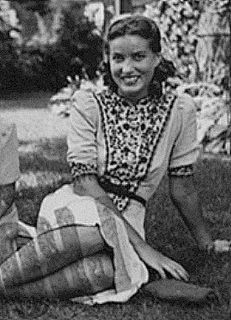 Once a ravishing beauty ... with a sharp wit, Edie mysteriously left a promising career as a dancer, model and actress to live with her aging mother... Once a ravishing beauty ... with a sharp wit, Edie mysteriously left a promising career as a dancer, model and actress to live with her aging mother...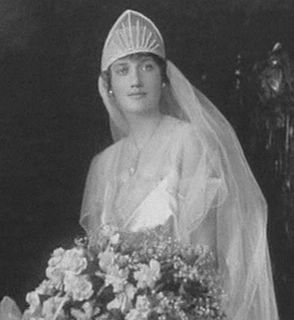 Big Edie ... in her youth bore an uncanny resemblance to Uma Thurman. The sister of 'Black Jack' Bouvier (Jackie Kennedy's father) and former wife of Wall Street lawyer Phelan Beale, Big Edie was the black sheep. Once at Grey Gardens, she was free to pursue the pastimes that brought her great joy and a bohemian reputation: singing, playing the piano and hanging out with her artistic, mostly male friends. Big Edie ... in her youth bore an uncanny resemblance to Uma Thurman. The sister of 'Black Jack' Bouvier (Jackie Kennedy's father) and former wife of Wall Street lawyer Phelan Beale, Big Edie was the black sheep. Once at Grey Gardens, she was free to pursue the pastimes that brought her great joy and a bohemian reputation: singing, playing the piano and hanging out with her artistic, mostly male friends.Their strangely witty dialogue would do Tennessee Williams proud. Is the film cruel or simply truthful? Both the Maysles brothers and the Beales thought the latter, and both staunchly defended the film. Those who leave this film thinking of the Beales as mere freaks are missing Grey Gardens' major questions ... one may echo Little Edie misquoting Robert Frost: 'Two roads converged in yellow wood. Pondering one, I took the other... Isn't that beautiful?'" More. |
| Acknowledged as one of the finest documentaries ever made, Grey Gardens visits the decaying Hamptons mansion ... to find these examples of American royalty living in squalour and madness, all the while bickering, flirting and confessing like characters in a Tennessee Williams play. So many moments here resonate in the memory - from 'Little Edie' cavorting coquettishly in some of the most bizarre outfits in human history, to 'Big Edie' belting out songs in her ruined voice. More. |
I think Edith's voice sounded quite fresh - not much different than the recording made decades earlier. It was just old fashioned and out of shape.
Anyway, to continue - Grey Gardens was included in Entertainment Weekly's Top 50 Cult Movies:
Proof positive that when an aristocratic American family gets big enough, some relatives will wind up shut-ins at an overgrown, feline-infested East Hampton mansion belting out shrill show tunes and feeding wild raccoons whole bags of Wonder bread in the attic. This bizarre, sad and touching portrait ... instantly became one of the most talked-about documentaries of all time.Cult members (there is a Yahoo fan club) can chant the quotes in unison:
 But you see in dealing with me, the relatives didn't know that they were dealing with a staunch character and I tell you if there's anything worse than dealing with a staunch woman... S-T-A-U-N-C-H. There's nothing worse, I'm telling you. They don't weaken, no matter what.
But you see in dealing with me, the relatives didn't know that they were dealing with a staunch character and I tell you if there's anything worse than dealing with a staunch woman... S-T-A-U-N-C-H. There's nothing worse, I'm telling you. They don't weaken, no matter what.This is the best thing to wear for today, you understand. Because I don't like women in skirts and the best thing is to wear pantyhose or some pants under a short skirt, I think. Then you have the pants under the skirt and then you can pull the stockings up over the pants underneath the skirt. And you can always take off the skirt and use it as a cape. So I think this is the best costume for today."
'Oh, look. That cat's going to the bathroom right behind my portrait.' 'Ughh, how awful.' 'No, I'm glad. I'm glad somebody's doing something that they want to do!'
| Apparently Mrs. Beale was so bored with the strictures of society that she hired an accompanist and started singing in New York nightclubs. This simply wasn’t done, especially by a woman from a prominent family with a husband and children. Instead of reining her in, Mr. Beale threw up his hands and moved out to his hunting lodge. Mrs. Beale’s father was less aloof. After threatening several times to disown her for her bohemian behavior, Major Bouvier finally cut her out of his will after she showed up, outrageously dressed, halfway into her own son’s wedding. ... All they really wanted was to show the world that they were just talented, misunderstood artists. All they really wanted was a chance to tell their side of the story. Along came the Maysles brothers, their camera loaded with film and flea collars around their ankles. The Beales are in charge of the whole show. Mrs. Beale sings her favorite tunes, boils corn for everyone on a Sterno stove on her bed, and generally berates Edie ... Edie shows off her eccentric outfits ... and performs her famous Virginia Military Institute dance. 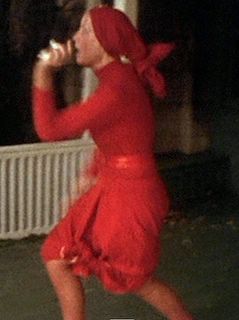 By participating, nay, collaborating in the film, the Beales lifted a great middle finger to the village of Easthampton, to the press, to their disapproving relatives, and to anyone who would dare tell them how to live their lives. Every song, every dance, every "costume," and every slice of Wonder Bread fed to a raccoon is a brazen act of defiance. By participating, nay, collaborating in the film, the Beales lifted a great middle finger to the village of Easthampton, to the press, to their disapproving relatives, and to anyone who would dare tell them how to live their lives. Every song, every dance, every "costume," and every slice of Wonder Bread fed to a raccoon is a brazen act of defiance....there is a lot of pain, need, and regret between these women that remains unresolved. Arguments unsettled for thirty years continue on as if the outcome still mattered. Betrayals of decades past resurface as if they had been committed yesterday. The two women, united in their struggle against family and society, are divided by their own personal power games between each other. ... Edie resents her mother for having taken up with a drifter who was eventually found dead in their kitchen. The speed with which a loving exchange between the two can turn into a heated row is practically head-spinning. 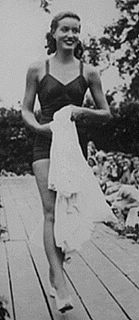 One of the most shocking moments in the film comes, however, not from one of the many contretemps between the two women, but from a quiet moment of reflection as they look through old photographs. One of the most shocking moments in the film comes, however, not from one of the many contretemps between the two women, but from a quiet moment of reflection as they look through old photographs.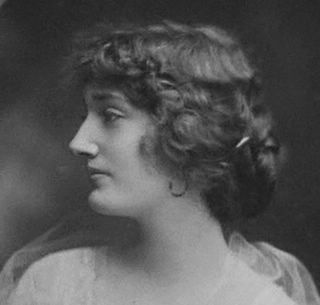 Edie holds up to the camera a few pictures of youthful, happy, stunningly beautiful women. More. Edie holds up to the camera a few pictures of youthful, happy, stunningly beautiful women. More. |
| [The Beales are] continually addressing the camera or rather, the microphone. They use it as a judge, an ally against each other and, in the case of Edie, as something more. "Darling David, where have you been all my life? Where have you been?" she calls out as she finishes a painful drum majorette routine. "All I needed was this man, David. David - I wish I'd had David and Al with me before this." More. |
"Mother trained me to do without men" was Edie's nonchalant explanation of her life without a husband. "I didn't want to be left all alone" is her mother's equally nonchalant explanation of why she chased away the suitors.
| "Raccoons and cats become a little bit boring," sighs Edie Beale towards the end of Grey Gardens. "I mean for too long a time." The [movie] was an amazing slow psychic train wreck ... a surreal sleight-of-hand ... Edie's lunatic confidences & scarves & flesh & animals & old eerie debutante photographs all seemed like broken shards of a psyche gaily tossing itself bit by bit into psychosis. Big Mama Edie sometimes helped out a bit (kind of like the Red Queen when for a brief moment here or there she says something congruent to Alice and seduces her, falsely, into thinking she's not in hell) -- by contrast to the imploding people and house surrounding her she seemed to offer an iota or two of clear-eyed commentary ... It was the coziest experience. Big Mama's voice calling from her bed, squealing for her daughter (while Edie mused in her "decorated" room, attempting to affix that silver mask to the painted plaster, "I can't get the thumb tack in the wall -- I've got the saddest life") ... "Let the kitties in. Give them luncheon." More. |
 Edie's mother, "Big" Edith Bouvier Beale is ... Yoda-like and semi-exhibitionist ("I'm gonna get naked here in a minute, Edie..what do you think of that?"), with a vulgar sense of humor that clashes with her society-lady poses. Big Edith and Little Edie rant and shriek at each other all through the movie, and any time Edie dares to sneak into a room to speak with the documentary crew alone, one can easily hear Big Mama Edith screaming in the background, "YOO-HOO, OH EDIE! EDIE, YOO-HOO!" More. Edie's mother, "Big" Edith Bouvier Beale is ... Yoda-like and semi-exhibitionist ("I'm gonna get naked here in a minute, Edie..what do you think of that?"), with a vulgar sense of humor that clashes with her society-lady poses. Big Edith and Little Edie rant and shriek at each other all through the movie, and any time Edie dares to sneak into a room to speak with the documentary crew alone, one can easily hear Big Mama Edith screaming in the background, "YOO-HOO, OH EDIE! EDIE, YOO-HOO!" More. |
What none of these reviewers discuss is mental illness. Jacqueline Kennedy unsuccessfully tried to deal with the two Edies by having their home condemned and forcing them out; defeated, she then just let them be.
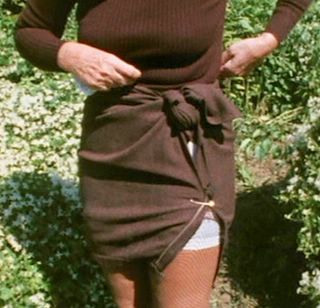 As a modern viewer I contemplate Edie restlessly adjusting her headscarf, making random (though charming) comments, accusing the handyman of stealing - I flinch as Big Edith sets out newspapers on her bed for the cat to poop on - and I wonder, why weren't these women getting help? The Maysles just walked away when the footage was shot and left them like this?
As a modern viewer I contemplate Edie restlessly adjusting her headscarf, making random (though charming) comments, accusing the handyman of stealing - I flinch as Big Edith sets out newspapers on her bed for the cat to poop on - and I wonder, why weren't these women getting help? The Maysles just walked away when the footage was shot and left them like this?Technorati Tags: Eccentricity, Mental Illness, Movies



 A few of my daughter
Melina's great posts:
A few of my daughter
Melina's great posts:








32 Comments:
That's both fascinating and repulsive. I don't know if I would like that movie or not.
Didn't I read where someone is creating a Broadway musical based on Grey Gardens? (OK - I admit it. I read Playbill Online everyday.) But seriously, a few months ago Playbill ran a story about a musical in the works about this. Can't remember who it involved - I'll search and see if I can find out the particulars. It is an intriguing (and yes, repulsive) tale.
Here's the link: http://www.playbill.com/news/article/93278.html
Looks like it will be an off-Broadway thing with Christine Ebersole. Should be interesting.
Jeez, I can't imagine anybody playing these women but themselves! Thanks for the link!
Your assessment of the Beales' lifestyle is spot on - in the creation of their own reality despite the affluence and (famously said by Little Edie - "that horrible Republican town of East Hampton") the culture of their larger environment, they were really acting out against the rules of a society they wanted no part of.
However, your last statement about the Maysleses is a bit too judgmental. If you listen to the "color bars" audio track at the end of the DVD, there is a recorded conversation between Little Edie and Albert Maysles from 2000, just before her death. They had been in frequent contact with one another after the release of the film (which ironically made them the toast of the New York art and fashion sets for a brief period in the mid-1970s).
At last I saw the movie!! I was down on the my local libriary's request list. Anyway, I liked it.
I watched it twice and its such a brief sampling that its hard to figure out much-- I did come away w/ some questions--
did they WANT to live in squalor in that house?
Could the Beale sons (there were two) help financially so they didn't live in such squalor?
Was little Edie really much more delusional than most folks? or just a worse editor of herself therefore SHOWING all her breaks w/ reality?
What characters!
You mention that Jackie Kennedy tried to get the home condemned. . . when in fact she was the reason it was not. East Hampton tried to get it condemned, and Jackie sent money to repair the house.
I VIEWED GREY GARDENS FOR THE FIRST TIME THIS DAY.
INTERESTING TO SAY THE LEAST - I WILL CONTINUE TO RESEARCH THEIR STORY - FASCINATING!
Great summary...but concerned about the judgementalism. It is important to get how sane and, in their own way, happy these two women were with themselves and their lives.
Any pity or even anxiety is misplaced. Recall that the most famous woman in the world, married to one of the richest men in the world, had rescued them. They were not without resources. They were living life on their own terms, which is part of their charisma.
I think, anyway.
Does anyone know the address of Gray Gardens and is it still standing?
You can learn lots more about this ongoing story of Grey Gardens at www.mygreygardens.com. Created by Robb Brawn, a long ago friend of "Little Edie" Beale, This is really a one stop for all GG info.
I am at a loss for why the lives of these women are being glarmorized in a play. You do not need to be a licensed mental health professional to see that these women are suffering from psychiatric disorders. At the very least, Little Edie is abusing alcohol and appears to be having psychotic symptoms. They have the right to live whatever life they wish but I think of how much better it would have been, had they received the treatment they so desperately needed.
Romanticizing and canonizing these women mystifies me. It's a travesty to call them artists. The Beales so-called talents were merely delusions and dreams. It's painful and embarrassing to watch the Virginia Military Institute scene. Little Edie is not a dancer anywhere except in her own mind. As for Big Edie's singing, any bored, rich narcissist who can carry a tune can hire an accompanist. She was long on ego and short on musicality. Her real legacy remains her neglectful and manipulative parenting, not her vocal repertoire. There are millions of hardworking singers, dancers, actors, studio artists and writers everywhere who struggle to exist without a destructive reliance on hostility and sarcasm, who respect animals, and who practice basic hygiene including using an actual toilet rather than the guest room floor. And they do so regardless of financial hardship or a less than ideal upbringing. The Edies were both mentally ill. Glorifying mental illness as the Maysles and the Beales themselves did is a crime against all those who struggle with it. The Beales clearly loved every minute of being filmed by the Maysles because they craved attention of any kind and self-promotion was in their blood. The Maysles didnt really exploit them as they had no self respect to begin with. These women couldnt play to the camera fast enough and exploited the filming opportunity themselves. Further, they didnt hold themselves accountable for their own existence, so of course they had no shame or discrimination about displaying it. The Edies were their own worst enemies and they loved each other to the worst of their abilities. It was a perfect match.
Wow. I am appalled by the judgements flying from the fingertips of you people. First of all, if you did not know them or have not been in such a situation, what right have you to judge? Sometimes, people form a very co-dependent relationship with another that others may find hard to understand. I have personally seen such behavior from some very SANE people. Second of all, they both were capable of making decisions, but through each of their own personal losses, seemed to also lose a bit of themselves. In the end, they had no one but each other to lean on. I am very pleased about the new HBO movie coming out, so that it may shine a light on some of your ignorant babbling. Perhaps before you leap to judge, you may next time do more research and read books and articles written by those who actually did know them rather than jumping to conclusions. If you had done some research, you might have a better understanding of what happened to these women and why they started to lose themselves. "Judge not lest ye be judged".
If you are rich you are called "eccentric", if you are poor you are just plain "crazy", therefore these 2 women were deemed eccentric. The documentary is a fascinating study of the descent into madness, but did anyone think of why they go this way? Being born into a society where you had to be something you were not, especially when you were a woman, made many women crazy. That, coupled with the realization that they were left with nothing but each other, definitely contributed to their decline. People asked, why weren't they helped? Realize that in 1975, it was still taboo to discuss mental illness in public, especially regarding relatives of prominent people. Remember the big hoopla when Betty Ford disclosed that she was an alcoholic. I'm sure that the rest of the family was relieved that these two women shut themselves in the mansion way out east on LI. Someone I know had an uncle who lived this way, and they were not able to get him out of the house until he became ill and had to be removed. Its not as easy as it seems to get help for people who don't think there is anything wrong with them.
I don't think it's "judgmental" to say that two women who were living ankle-deep in feces and fleas had some mental health problems. You don't have to know them personally or have an advanced degree to see that. I think it's the people who DON'T have any first-hand experience with mental illness who say these women were "fascinating!" and "delightfully eccentric!" I just found them sick and sad and I had to turn the documentary off about halfway through. I wish that someone had been able to help them, rather than making entertainment out of them.
Their story was the ultimate fall from grace. I believed if they were able to keep their help--maids and grounds keepers--they would have been fine,the lost of financial support put them in this situation.
Does anyone think there is a label for thier mental illness? Just wondering. I have seen similar situtions but just not with people that have or had money.
I think it's sweet to want to romanticize them but ultimately cowardly. People like to explain away abuse because it's very ugly and very common in so many families. No one wants to see a reflection of their own family tragedies. But, take it from a daughter with a mother like Big Edie, what was displayed was the cycle of verbal and emotional abuse so many children grow up with. On the surface Little Edie had no scars but emotionally and psychologically she was crippled. Between her mother's and father's actions she desperatly needed protection. Alcohol is a depressant and it undoubtedly made her symptoms worse. Had her father and other relatives intervened it may have saved her fragile mind much sooner but at least she was able to go free once her abusive mother died.
My guess would be Diogenes syndrome - characterized by reclusiveness, living in filth, & extreme hoarding. Its believed to be linked to frontal lobe dementia.
Hebephronic schizophrenia. Delusions, silliness/giggling/self-satisfied smiing, lofty manner, rambling and disorganized thought pattern and speech, reiterated phrases ("...you understand"), preocccupation w/ religion or abstract themes (Catholicism and Astrology in Little Edie's case). This type of schizophrenia usually begins btwn ages 15 - 25.
I am so in love with these two !
I agree with the other Anonymous. I am watching this film for the first time, and so much if it squares with everything I've read about mental illness and learned second-hand (or through first-hand observation) about my own relatives who have suffer(ed) from manic depression or just regular old depression. It's sad.
These women were living, just like any of us. This was their choice..what worked for them. You shouldn't judge them..since you have no idea what was going on in their heads. It's a magnificent story of the society back then...and of two very strong characters..
I think they had incredible wealth and it dwindled, for whatever reason. They had service in the house and everything was done for them. They did not know how to care for themselves, and yeah we are all accountable for our own behavior but it need not be judged with such disdain. It is a different class culture from starving artist. When considered in a cultural and gendered context it makes perfect sense. I do not see anyone consciously glorifying mental health illness. I am happy for Little Edie in that she eventually sold the house and actually went on to live in cities for the rest of her life.
I was looking online to see if I could find a name for the condition these two women suffer from/enjoy (I'm not sure which). Never knew I had so much in common with Jackie Kennedy Onassis - having crazy relatives. Are they crazy? Maybe it's all relative.
Address is 3 West End Road. Still standing and been restored
I came across this story of Grey Gardens an the two women who lived ther quiet by accident. Since then I have found their exsistance fascinating!! I also recall watching the original documentary made on them way back in 1975. What I can't get my head round is why Jackie Kennedy Onassis allowed her aunt an first cousin to fall into such utter disarray. Surely with all that money that she had she would of dropped by an helped before things got so drasric. I have learnt she did help with some money but it seems to me she was embarrassed to be linked with them an only gave them the monies so as not to lose grace !!! No love loss there then !! I also think it's a shame that Big Edie seemed to monopolize her daughter an get rid of any eligable suiltors for Little Edie.....
Both Big Edie and Little Edie are clearly alcoholic. In the '20s and 30s', at the height of Big Edie's addiction, the word alcoholism had not even been coined, nor had the disease concept of alcoholism been forwarded. The relationship between the two is codependent, with Big Edie the controlling, bossy, and domineering alcoholic.
Is it any wonder that her husband left her, and that her sons moved far away from her? Yes, they both seem to suffer as well from hoarding and psychosis, especially Little Edie, but if you think of the shame and humiliation living with a drunken mother in that period and in that class must have caused for the children, you can better understand Little Edie's madness.
Of course, if these were two lower-class women without famous relatives who lived in such squalor and degradation with untreated alcoholism and mental illness, no one would go out of their way to make a film of them, and they wouldn't have a bevy of fans who treat them as stars and "eccentrics." They would be avoided, shunned, and if they got any help at all, it would probably be at the behest of some governmental agency who would intervene. The reason people glorify them is because they were once wealthy and related to Jackie Onassis.
We are really only in the infancy of understanding alcoholism and how it destroys the lives of those whom it consumes. The tragedy is that people make these sick, untreated women into cult heroines, driven chiefly by a gay subculture that finds distressed, bizarre, and crazy women "endearing" and "enchanting." The film seems exploitative, as do the many adaptations of their dysfunctional relationship into screen and theatrical productions. Instead of glorifying these sad and sick women, those who worship them should try to volunteer their time in mental hospitals or in helping hoarders clean up their homes. That might help them understand that there is nothing very amusing, charming, or endearing about alcoholism and mental illness in the midst of squalor and filth.
Interesting comments. Just watched the documentary. Interesting individuals, but must agree that they appeared to be suffering from some type of mental illness. They also remind me of some folks I have known over the years. Interesting that little Edie didn't want to be buried by her mother.
What happened to Big and Little Edie was tragic! I don't understand why people glorify and obsess over a story of lost love, mental illness, co-dependency and shattered dreams.
As a poster on another blog stated, if you put these same two women in a double-wide trailer in rural Alabama, we'd all be calling them "white trash" - not "fascinating eccentrics".
Post a Comment
<< Home